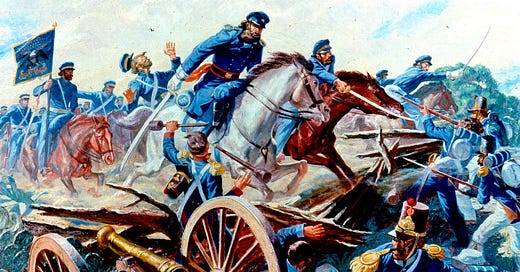The Empire Smiles With Teeth: Trump, Mexico, and the Mirage of Intervention
Donald Trump publicly proposed deploying U.S. military forces into Mexico to target and destroy drug cartels. Framed as a response to rising fentanyl deaths and cartel violence, the proposal has gained traction among some conservative lawmakers, many of whom have introduced legislation to authorize such actions. But beneath the rhetoric of law and order lies a darker calculus.
Viewed from the lens of the empire, this is simply an "offer." A gift, a gesture, a helping hand extended across borders thick with blood and silence. Donald Trump, master of the immaculate lie, suggests that he is prepared to send U.S. troops into Mexico. To “help” fight the cartels. To “crush” the narco-state. To “save” the Mexican people from their own suffering. And the world nods, distracted, or perhaps anesthetized, by the ceaseless whir of American benevolence dressed in fatigues.
But this is not an offer. This is not generosity. This is the bare, bristling snarl of empire. It is the old playbook, dusted off and dripping with new oil. It is gunship diplomacy disguised as border security. It is neo-imperialism; not creeping, but marching, stomping, whining with drone propellers and the ghosts of Fallujah and Kandahar.
Trump's military overture is a fantasy rooted in steel and supremacy, not strategy. To speak of military intervention in Mexico as if it were a new idea is to forget history, or worse, to erase it. The U.S. has invaded Mexico many times before. In 1846, the Stars and Stripes pierced the Mexican sky, tore through its cities, and annexed half its land. Texas, California, New Mexico became the prizes of conquest. Now, in Trump’s fevered calculus, the cartels are the new Aztecs, drug tunnels the new temples, waiting to be razed by Patriot missiles and the purity of American resolve.
He does not say the quiet part out loud. That the cartels exist, in part, because of U.S. demand. That guns cross the border from north to south as easily as fentanyl travels north. That the billions of dollars coursing through the veins of the drug economy begin in American boardrooms, pharmacies, and clandestine warehouses. That the monster Trump claims to slay is one his own nation helped rear.
But to Trump, Mexico is not a neighbor. It is a laboratory. A testing ground. A failed state, useful only as a foil against which he can project strength, chaos, and the illusion of order through force. He speaks of sending in troops the way one might talk about exterminating pests, without nuance, empathy, or the faintest understanding of sovereignty.
And there is the heart of it. Sovereignty. What Trump offers is not assistance; it is subjugation. The Mexican state, for all its flaws and fractures, is still a state. To violate its borders in the name of peace is to annihilate the fragile idea of autonomy that nations like Mexico must clutch close like a relic in the face of American dominance. An intervention would not be surgical; it would be colonial. It would not target cartels; it would ravage communities, decimate infrastructure, and unleash the familiar cycle of displacement and despair.
Trump’s neo-imperialism wears a MAGA hat and wraps itself in the flag, but it is cut from the same cloth as the old imperialism. It believes in exceptionalism, in manifest destiny dressed up for the 21st century. It believes the world is a chessboard and the U.S. the only hand fit to move the pieces. It reduces entire nations to problems to be solved with bombs, not partners in a shared, if turbulent, future.
And yet, this vision resonates. With voters, with strategists, with those who cannot distinguish between strength and brutality. Because Trump offers more than a policy; he offers a spectacle. The spectacle of invasion framed as intervention, of dominance cloaked in the language of democracy. His promise to “obliterate” the cartels is not about drugs or violence or security. It is about power. About reminding the world who gets to play god, and who must kneel.
To analyze Trump’s words as mere policy misses the theater, the mythology, the menace. When he speaks of war on the cartels, he does not mean a targeted campaign; he means a cleansing. A crusade. A reaffirmation of American muscle in a world that no longer buys into its myths. He is a man nostalgic for the empire he believes was stolen from him, from his people, from the trembling nation he vows to make “great” again.
But greatness, as defined by Trump, is a zero-sum game. For America to rise, others must fall. Mexico, in his narrative, is not a partner in crisis; it is the next Afghanistan. The next Iraq. The next body to be broken in the name of American peace.
And so, we must see this offer for what it is: not a hand extended, but a fist. Not a promise, but a threat. A continuation of the imperial fantasy that never quite left the American bloodstream, that lingers like lead in the pipes, invisible but lethal.
Trump does not need to invade Mexico to win. He only needs the fantasy. The image. The chant. The certainty that even if no boots land on Mexican soil, the suggestion alone is enough to remind the world who holds the whip.
Because in the empire’s theater, the spectacle is the strategy. And Trump, more showman than statesman, knows exactly how to direct it.




